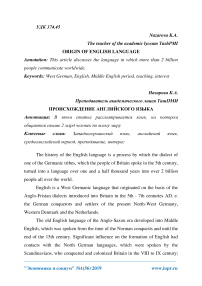Origin of English language
Автор: Nazarova K.A.
Журнал: Экономика и социум @ekonomika-socium
Статья в выпуске: 1-1 (56), 2019 года.
Бесплатный доступ
This article discusses the language in which more than 2 billion people communicate worldwide.
West german, english, middle english period, teaching, interest
Короткий адрес: https://sciup.org/140241424
IDR: 140241424
Текст научной статьи Origin of English language
The history of the English language is a process by which the dialect of one of the Germanic tribes, which the people of Britain spoke in the 5th century, turned into a language over one and a half thousand years into over 2 billion people all over the world.
English is a West Germanic language that originated on the basis of the Anglo-Frisian dialects introduced into Britain in the 5th - 7th centuries AD. e. the German conquerors and settlers of the present North-West Germany, Western Denmark and the Netherlands.
The old English language of the Anglo-Saxon era developed into Middle English, which was spoken from the time of the Norman conquests and until the end of the 15th century. Significant influence on the formation of English had contacts with the North German languages, which were spoken by the Scandinavians, who conquered and colonized Britain in the VIII to IX century;
This contact led to numerous lexical borrowings and grammatical simplifications. The language was influenced by the conquests of the Normans, who spoke French, called the Old Norse language, which in Britain developed into the Anglo-Norman language. Many Norman and French borrowings have been included in language vocabulary related to the church and the judicial system. The spelling system, established in the Middle English period, is used today.
Early modern English - the language of Shakespeare, has been common since around 1500. It reflects many borrowings of the Renaissance from the Latin and ancient Greek languages, as well as borrowings from other European languages, including French, German and Dutch. Changes in pronunciation during this period included the Great Vowel Shift (phonetic changes in the English language in the XIV-XV centuries), which affected the properties of long vowels. Modern English, which is still spoken today, has been in use since the end of the 17th century. Since the time of the British colonization, English has become popular in Great Britain, Ireland, the USA, Canada, Australia, New Zealand, India, parts of Africa, and other countries. Currently, it is also a means of inter-ethnic communication - Lingua franca.
Old English included various groups of dialects reflecting the origins of the Anglo-Saxon kingdoms created in different parts of Great Britain. As a result, the West Saxon dialect of the language became dominant. The Old English language had a great influence on the middle English. A variation of the English language is Scottish. It is traditionally spoken in some parts of Scotland and Northern Ireland. Sometimes it is considered as an independent language.
English has its roots in the languages of the Germanic peoples of Northern Europe. During the time of the Roman Empire, most of the German settlements (Germany) remained independent of Rome, although some southwestern districts were part of the empire. Some Germans served in the Roman army.
Troops of Germanic tribes, such as the Tungras, Batavians, and Friezes, served in Britain under the Romans. German settlements expanded during the Great Migration with the fall of the Western Roman Empire.
The languages spoken by the Germanic peoples, originally settled in Great Britain, were part of the West Germanic branch of the Germanic language family. They consisted of dialects of the Ingwean language group (named after a large group of Germanic tribes of Ingewons) spoken by the northern peoples of modern Denmark, North-West Germany and the Netherlands. Due to some similarities between the old English and the old Frisian languages, this group was called the Anglo-Frisian languages.
Список литературы Origin of English language
- Jeffrey McQuain & Stanley Malless. Coined by Shakespeare: Words and Meanings First Used by the Bard. Merriam-Webster Inc, USA (1998). ISBN 0-87779-353-0.
- Albert C. Baugh, Thomas Cable: A History of the English Language. 5. Auflage. Prentice Hall, Upper Saddle River NJ 2001, ISBN 0-13-015166-1.
- Fausto Cercignani: Shakespeare’s Works and Elizabethan Pronunciation. Clarendon Press, Oxford 1981


